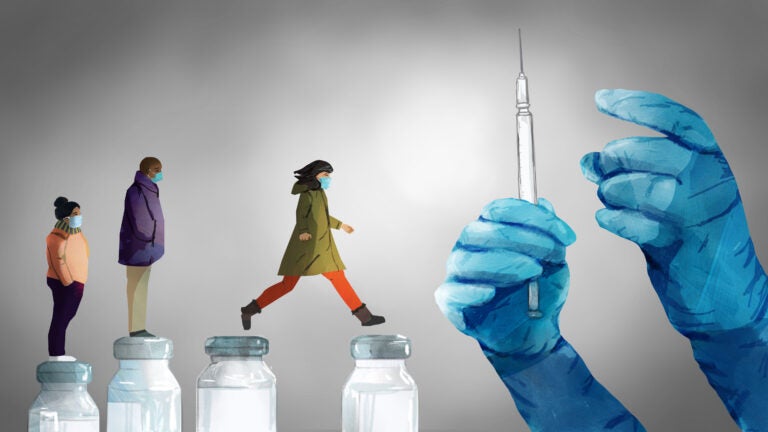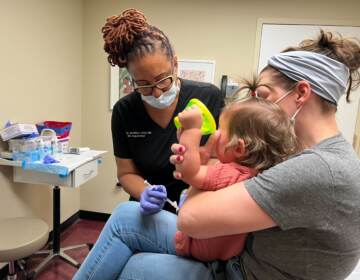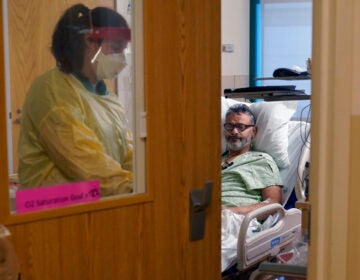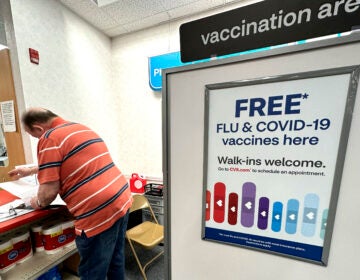Is it ever OK to jump ahead in the vaccine line?

Maria Fabrizio for NPR
COVID-19 vaccines are scarce. Many people who want the shots can’t get them yet, either because they’re not yet eligible, according to priorities set by their state or county, or because there aren’t any available appointments.
In an ideal world, there would be universal access to the vaccines right now, says Faith E. Fletcher, “so that individuals are not placed in the position where they are encountering moral dilemmas as to should I accept this vaccination or not?” Fletcher is a bioethicist at the University of Alabama at Birmingham and senior advisor to the Hastings Center, a leading U.S. research institute in bioethics.
As it is, the U.S. is in the midst of a COVID-19 immunization rollout where the rules of eligibility differ from state to state, county to county and even sometimes across town lines. CDC guidelines on equitable distribution have been revised by states, as governors have been pressured to make distribution of what’s still a scarce resource go faster. Whether you’re eligible for a vaccine may depend not only on your age or occupation, but on where you live, what company you work for, and who you know.
It can all seem pretty unfair. If you think the system isn’t working, is it ever fair to cut in line?
NPR spoke with three bioethicists — Fletcher, along with Ruth Faden, founder of the Johns Hopkins Berman Institute of Bioethics, and Gabriel Lázaro-Muñoz of the Baylor College of Medicine, to reason out what’s right.
If I hear at a grocery store that has extras that are going to waste, is it fair for me to get one, even if it’s not my turn?
The panel was unanimous. “100% yes,” says Lázaro-Muñoz. If a dose is truly in danger of going to waste, and you’re there and you want it, you should take it. Still the ethicists cited caveats.
Doses from defrosted, opened vaccine vials must be used or tossed within six hours. So if your local pharmacy has a few extra doses due to cancellations, or if a freezer failure causes vaccines to unexpectedly thaw, it’s ethical to accept a vaccine that would otherwise be going into the trash, even if you’re a healthy young person who wouldn’t otherwise be eligible to get one.
“If you do take it, you are contributing to decreasing the risk of getting COVID yourself, and the risk others may face by interacting with you,” Lázaro-Muñoz adds.
But even if the move is ethically acceptable, there could be other things you could try that would be ethically preferable, Faden says. For instance, “If you’ve got a colleague or a family member of a neighbor who’s already in a priority group, and you can call them up and help them get there, that’s better,” she says. Or if you have a friend at higher risk than you, say with a serious comorbidity, matching them with the “extra” dose would also be preferable, even if they’re not yet officially eligible for a vaccine.
Faden says the pharmacy could also help the situation by offering them first to older people, who are considered to be at higher risk of getting very sick from the virus if they catch it. “One thing the pharmacy could have done is gone on the PA system and said, ‘is there anyone over 60 in the store who needs a vaccine?'” she says.
“But sometimes it doesn’t work that way. And the worst outcome, for a vial of Pfizer or Moderna vaccine, would be to have to throw even a single dose away,” Faden says.
If I’m not eligible in my county, but I could be if I lived in the county next to mine, should I drive over to get it?
In this case, the answer is “100% no,” says Lázaro-Muñoz.
Here, he says, you’re not preventing a vaccine dose from going to waste; instead, you’re taking a slot that was intended for your neighbor.
“The allocation is very limited right now. Any county that’s getting these vaccines is having a hard time getting them, and they are getting them in part based on a consideration of their population, and what their population needs,” Lázaro-Muñoz says.
People engaged in active line-cutting — strategically positioning themselves to receive vaccines that were not intended for them — may be acting with “vaccine entitlement,” says Fletcher: “There are certain people who feel justified in accessing and skipping the line and going to a county over or state over because they’re so accustomed to having access, and believe they are deserving of resources that others may not have.”
For instance, in cases where people from wealthier neighborhoods are going to poorer neighborhoods that have been prioritized to receive COVID-19 vaccines, the outsiders are flexing their privilege, Fletcher says. “They have access to transportation. They have access to information, to the internet.” It’s a move that undermines efforts to reduce health inequities.
“The system relies on people presenting themselves accurately,” Faden says, “If there’s a theme through this, it’s that people need to follow the rules of the game, even when the rules are not necessarily ethically the best rules possible.” If the county next door is intentionally serving as a vaccination hub for your region, for instance, it would make sense for you to schedule an appointment when you are eligible. But if those appointments are not yet intended for you, you should not break the rules to get one.
Some places have been slower to give out shots than others, which has led to considerable frustration, Faden acknowledges. But states are incorporating lessons from their first weeks of vaccine administration, and working to get vaccines out more efficiently and equitably. At this stage, she says, “I would urge people to [resist the temptation to seek vaccines across borders] and hope that their states are going to self-correct shortly and do a better job.”
And if the situation seems unfair, Faden says you should absolutely organize, protest, or call or email elected officials to help improve the system. Instead of cheating, she says, “the pressure should be on changing the rules.”
Why should smokers get priority over nonsmokers?
For some people, smoking cigarettes is a voluntary behavior. In others, it’s an addiction they haven’t been able to quit. Regardless, being a current or former smoker increases a person’s risk of getting severely ill if they get COVID-19.
The CDC’s vaccine advisory committee, which laid out its prioritization advice in a preliminary way last fall, considers smoking to be a high-risk medical condition and recommends that smokers, as well as those with a number of other underlying conditions, get prioritized for vaccines ahead of the general population of healthy young people.
That ranking doesn’t exactly square with the way many Americans judge smokers — as having brought their addiction on themselves. But the ethical goals of the U.S. government’s COVID-19 vaccination guidelines, says Lázaro-Muñoz, are to save as many lives as possible.
“We’re not focused on which of these lives we think might be more valuable to society,” he says. “We’re prioritizing just saving lives, period.”
To single out smokers as not deserving priority for vaccination, when they are at higher risk of severe COVID-19, is a “slippery slope,” Fletcher says. “People could make the same argument, for instance, with Type 2 diabetes and COVID-19 risk. Some might argue, well, Type 2 diabetes is strongly linked to obesity, and why is it that those individuals have access to vaccines?”
She says that withholding vaccines from high-risk people with certain health conditions would exacerbate health inequities. Smoking is more prevalent among poor people and those who live in stressful environments. “We should focus on how we can provide equitable vaccination rollout to all people, especially those who are most vulnerable, regardless of how their vulnerability emerged,” she says.
“If we could, maybe we would treat cigarette smoking for some people differently than cigarette smoking for other people,” says Faden. For instance, whether a person could quit but isn’t trying, or whether a person picked up smoking when they should have known better. “But we can’t really tease it apart, and we certainly can’t do it at a point of service,” such as when someone presents for a COVID-19 vaccine.
And protecting smokers — along with anyone at high risk of severe COVID-19 — will help alleviate the burden on hospitals in this pandemic. “It’s actually in all of our interests if people who smoke are protected,” says Faden. “It will be one less group that contributes to the hospitalization burden from the disease.”
Couldn’t a nonsmoker easily lie and cut the line? Even now, while some states are requiring significant paperwork from those who show up for vaccine appointments, others are looser, based on the honor system.
“I’m sure there will be people who will say whatever they can to get access to the vaccines,” Lázaro-Muñoz says, but he predicts this behavior will be the exception, limited to “a few unethical neighbors,” instead of a major loophole that many will seek to exploit.
There’s a downside to making people jump through too many hoops to get it: Requiring documentation of someone’s smoking habit, or medical records to verify comorbidities, would add barriers to access that would likely result in a “worse outcome,” in which fewer high-risk people get vaccinated, says Lázaro-Muñoz.
“I think it’s better to live with [the probability that a small number of people will cheat] than to add more requirements to get access to the vaccine,” he says, adding “if we start asking people for evidence, we’re going to make it harder for us, as a society, to get these vaccines out and get to herd immunity.”
9(MDAzMzI1ODY3MDEyMzkzOTE3NjIxNDg3MQ001))


![CoronavirusPandemic_1024x512[1]](https://whyy.org/wp-content/uploads/2020/03/CoronavirusPandemic_1024x5121-300x150.jpg)



